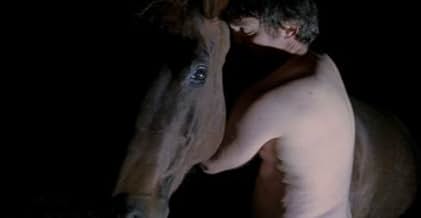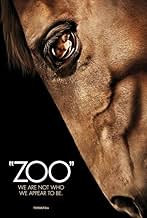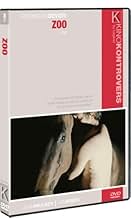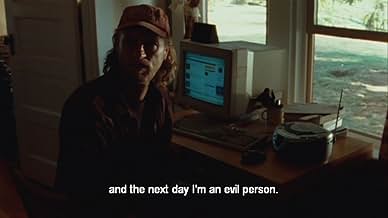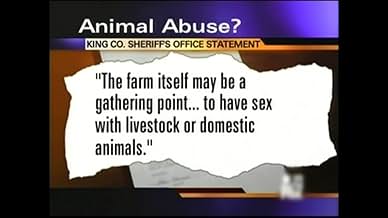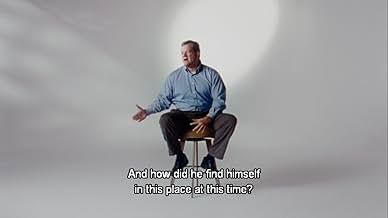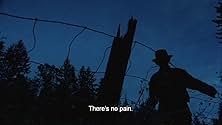IMDb रेटिंग
5.5/10
3.1 हज़ार
आपकी रेटिंग
अपनी भाषा में प्लॉट जोड़ेंA look at the life of an Enumclaw, Washington man who died as a result of an unusual encounter with a horse.A look at the life of an Enumclaw, Washington man who died as a result of an unusual encounter with a horse.A look at the life of an Enumclaw, Washington man who died as a result of an unusual encounter with a horse.
- पुरस्कार
- 1 जीत और कुल 5 नामांकन
Forest Fousel
- Capitol Hill Man
- (as Forest L. Fousel)
Andrew Scott McIntyre
- Military Man
- (as Andrew McIntyre)
Michael J. Minard
- Cop #1
- (as Michael Minard)
फ़ीचर्ड समीक्षाएं
Aside from the cinematography, which is outstanding, this documentary is not worth watching. The subject obsession is incomprehensible, if not reprehensible. While I can certainly feel compassion for the man's family, I can only shake my head at what he subjected himself to, time and time again. What can a man be thinking to allow a half ton animal to mount him and shove its two foot long penis into him?? For those of you who are tempted to download and watch the actual footage of the featured encounter (which is flashed briefly a few times in the film itself) my advice to you is don't. I have to admit that I allowed my curiosity to get away with me. Now I wish I could unwatch it.
Please don't let the graphic title of this user-comment mislead you (I just couldn't resist writing this), as "Zoo" is in fact - everything but an exploitative and perverted excuse to finally revolve a movie on the controversial topic of bestiality. As strange as it may sound, this documentary/drama is actually very sober, tasteful and not the least bit disrespectful towards people with peculiar (to put it mildly) sexual likings. Robinson Devor, the young and clearly promising young writer/director of "Zoo", based himself on real events as they occurred in Seattle in 2005. A middle aged and divorced man died there as a result of internal bleedings after and here comes the kicker experiencing sexual intercourse with a horse. The media promptly jumped onto this story and in practically no time the authorities unraveled a small but nevertheless fanatic network of people who regularly gathered for a weekend of beer, pizza and
animal sex. The "shocking" news spawned a giant debate and even some riots because apparently there weren't any laws against bestiality in the state of Washington at the time and all sorts of animal rights organizations launched hate-campaigns. Rather than to bluntly categorize the Zoos (short term for Zoophiles) as sick & twisted individuals as well, Devor's film digs a lot deeper into their pasts and personalities. The documentary primarily depicts these Zoos as confused and introverted people with a devoted affection for animals. Of course this doesn't justify their sexual preferences, but at least you don't simply label them as a bunch of perverted freaks. In the hands of any other random exploitation-filmmaker, "Zoo" probably would have existed of nothing more than images of slavering rednecks cheering and queuing to bend over in front of a horse. There isn't a single explicit shot to be found in "Zoo" and the story hardly even hints at sleaze or schlock. If anything, you almost feel like Robinson Devor is to blame for patronizing & protecting these Zoophiles too much, but then still you don't as they already suffered more than enough scandal in various other media. The narrative and filming style of "Zoo" is also quite original and refreshing. The on screen characters are, with the exception of some supportive ones, hired actors but the guiding voice-overs come from actual interviews with the real Zoos. The bitterness and noticeable martyr-tone in their voices gives a whole unique dimension of realism to the film. The photography is truly enchanting and the sober music, oh my God the music, literally sent cold shivers down my spine. Regardless of the questionable subject matter, "Zoo" is a dreamy & highly elegant film that comes with my highest possible recommendation.
Based on the case of a Boeing employee who died from a perforated colon while being anally penetrated by a horse in Enumclaw, a town in rural Washington state, "Zoo" (the term is short for zoophilia, the sexual love of animals) is a brave attempt to address a highly controversial and polarising issue in a dispassionate way that neither condemns nor sympathises with the people involved in bestiality. The film recreates the events leading up to the man's death and its aftermath in a way that's part documentary / part drama with re-enactments of scenes and emphasising a soft, dream-like mood with delicately muted, wafting music. Director Devor uses four narrators, talking to an unseen listener, to retell the events from the point of view of the people who knew the man, referred to in the film as "Mr Hands", and this approach thrusts (um) the viewer right into the twilight world of zoophiles: how they found each other through Internet contacts, how they organised their tryst and their reactions when the man was injured and when their secret activities became known to the outside world.
The film has the air of a noir mystery: the majority of scenes are filmed in shadow, at night or in dark colours with blue being predominant. The story unfolds slowly and elliptically and anyone who is unaware in advance as to what the film is about may be puzzled at the indirect way "Zoo" tiptoes around the subject until near half-way when a news report drops its headline in deadpan style. The pace is very steady, perhaps too steady and slow, and the film often dwells on several still camera shots which look deliberately staged as if for static display purposes. Close-ups and landscapes often look very abstract with washes of blue across a background; an orchard looks like a misty fairyland beneath a light coating of rain. The mood is even and quite blank until a scene in which police investigators viewing a DVD recording appears; the police react with horror and shock watching the act of buggery and only then do viewers feel something creepy crawl up their spines.
For all its delicacy, "Zoo" gives the impression of something much bigger than its subject matter struggling to make itself seen and heard: the zoophiles give the impression of wanting companionship, a sense of belonging, a need to share something special that gives meaning to their lives, and thinking they have found it. They seek a utopia in which everyone is equal and no-one is judged by how much money s/he earns or how educated s/he is. The places in rural Washington where many of them live look impoverished and some zoophiles may well be drifters or marginalised people barely managing to make a living and survive. (Difficult to tell as many scenes are recreations of actual events with actors playing the zoophiles.) If the film had directly addressed the need of the zoophiles for meaning, for companionship, it might have been able to gain more co-operation from the people involved; as it is, the level of co-operation it got is very restricted. The dead man's family refused to be interviewed for the film which is a pity as the wife and child might have presented him as more well-rounded than he appears in "Zoo".
The film also suffers from subjectivity and could have done with a more objective view of its subject. Interviews with psychologists and psychiatrists on zoophilia and perhaps other conditions such as lycanthropy (identifying oneself as an animal rather than as a human) might have shed light on why some people are sexually attracted to animals and to some kinds of animals in particular. The goals of the project would still be met: the issue would not be sensationalised and viewers might come away with a greater understanding of zoophilia and other bizarre philias. Instead the film can only concentrate on the horse-trainer, Jenny Edwards, who took charge of the horses after the incident became public: she admits that after having followed the case in its detail and ordering one of the horses gelded, that she's "on the edge" of understanding the zoophiles' obsession. It appears also that the director and film-crew were as much in the dark as Edwards was while making the film; even after its completion, the film-makers still were scratching their heads trying to make sense of what they'd done. Not a good portent for a film.
Yes, zoophilia is a difficult subject to talk about, let alone film, without making it look disgusting, degraded or ridiculous and pathetic. "Zoo" tries hard not to take one side or the other but with a subject like this, the attempt to be "balanced" is a tough act indeed to pull off. Some viewers will be irate that the film advocates no position at all, as if it's the film-makers' duty to tell them what they must believe. I think though that to achieve the "balance" that "Zoo" strives for, the film-makers should have pulled back from their subjects and taken a more generalised view of the issue of zoophilia; the police officers, the courts, psychologists and medical who dealt with the dead man and his friends should have been consulted for their opinions about zoophilia.
The film has the air of a noir mystery: the majority of scenes are filmed in shadow, at night or in dark colours with blue being predominant. The story unfolds slowly and elliptically and anyone who is unaware in advance as to what the film is about may be puzzled at the indirect way "Zoo" tiptoes around the subject until near half-way when a news report drops its headline in deadpan style. The pace is very steady, perhaps too steady and slow, and the film often dwells on several still camera shots which look deliberately staged as if for static display purposes. Close-ups and landscapes often look very abstract with washes of blue across a background; an orchard looks like a misty fairyland beneath a light coating of rain. The mood is even and quite blank until a scene in which police investigators viewing a DVD recording appears; the police react with horror and shock watching the act of buggery and only then do viewers feel something creepy crawl up their spines.
For all its delicacy, "Zoo" gives the impression of something much bigger than its subject matter struggling to make itself seen and heard: the zoophiles give the impression of wanting companionship, a sense of belonging, a need to share something special that gives meaning to their lives, and thinking they have found it. They seek a utopia in which everyone is equal and no-one is judged by how much money s/he earns or how educated s/he is. The places in rural Washington where many of them live look impoverished and some zoophiles may well be drifters or marginalised people barely managing to make a living and survive. (Difficult to tell as many scenes are recreations of actual events with actors playing the zoophiles.) If the film had directly addressed the need of the zoophiles for meaning, for companionship, it might have been able to gain more co-operation from the people involved; as it is, the level of co-operation it got is very restricted. The dead man's family refused to be interviewed for the film which is a pity as the wife and child might have presented him as more well-rounded than he appears in "Zoo".
The film also suffers from subjectivity and could have done with a more objective view of its subject. Interviews with psychologists and psychiatrists on zoophilia and perhaps other conditions such as lycanthropy (identifying oneself as an animal rather than as a human) might have shed light on why some people are sexually attracted to animals and to some kinds of animals in particular. The goals of the project would still be met: the issue would not be sensationalised and viewers might come away with a greater understanding of zoophilia and other bizarre philias. Instead the film can only concentrate on the horse-trainer, Jenny Edwards, who took charge of the horses after the incident became public: she admits that after having followed the case in its detail and ordering one of the horses gelded, that she's "on the edge" of understanding the zoophiles' obsession. It appears also that the director and film-crew were as much in the dark as Edwards was while making the film; even after its completion, the film-makers still were scratching their heads trying to make sense of what they'd done. Not a good portent for a film.
Yes, zoophilia is a difficult subject to talk about, let alone film, without making it look disgusting, degraded or ridiculous and pathetic. "Zoo" tries hard not to take one side or the other but with a subject like this, the attempt to be "balanced" is a tough act indeed to pull off. Some viewers will be irate that the film advocates no position at all, as if it's the film-makers' duty to tell them what they must believe. I think though that to achieve the "balance" that "Zoo" strives for, the film-makers should have pulled back from their subjects and taken a more generalised view of the issue of zoophilia; the police officers, the courts, psychologists and medical who dealt with the dead man and his friends should have been consulted for their opinions about zoophilia.
I am puzzled to find so many comments that are positive about this. To describe something so grotesque as "beautiful." I remember hearing something about the actual incident but I had always written it off as urban legend. Now I find that they made a documentary about it. I love documentaries but to make one about the rape of defenseless animals is beyond reprehensible. I tried to find more information on the internet about the actual incident but could find less information than about the movie they made about it. I had never even heard of this movie until now. This is rape people. Not natural in the least. I don't see how anyone is anything but repulsed by this.
OK. Yeah, we all know what it's about. Get over it.
Are you done? Good. Now sit down and watch this film.
"ZOO" is a groundbreaking film not simply because of its taboo subject matter, but how it weaves said subject matter into this visceral experience WITHOUT EVER SHOWING YOU A SINGLE SHOCKING THING! Watching this film was like experiencing something born from a love triangle consisting of Werner Herzog, Errol Morris and David Lynch.
And the music... Aah! The music was perfect!
"ZOO" is exactly the kind of progressive film making we as the paying public should be embracing.
Are you done? Good. Now sit down and watch this film.
"ZOO" is a groundbreaking film not simply because of its taboo subject matter, but how it weaves said subject matter into this visceral experience WITHOUT EVER SHOWING YOU A SINGLE SHOCKING THING! Watching this film was like experiencing something born from a love triangle consisting of Werner Herzog, Errol Morris and David Lynch.
And the music... Aah! The music was perfect!
"ZOO" is exactly the kind of progressive film making we as the paying public should be embracing.
क्या आपको पता है
- ट्रिवियाThe horse performer in this movie was a Thoroughbred mare named 'Somebodys Baby', and is a former successful racehorse. The horse in the incident portrayed was in reality an Arabian stallion.
- कनेक्शनFeatured in Aristokraticheskiy kinematograf: एपिसोड #1.9 (2011)
टॉप पसंद
रेटिंग देने के लिए साइन-इन करें और वैयक्तिकृत सुझावों के लिए वॉचलिस्ट करें
- How long is Zoo?Alexa द्वारा संचालित
विवरण
बॉक्स ऑफ़िस
- US और कनाडा में सकल
- $69,770
- US और कनाडा में पहले सप्ताह में कुल कमाई
- $7,811
- 29 अप्रैल 2007
- दुनिया भर में सकल
- $69,770
- चलने की अवधि1 घंटा 15 मिनट
- रंग
- पक्ष अनुपात
- 1.78 : 1
इस पेज में योगदान दें
किसी बदलाव का सुझाव दें या अनुपलब्ध कॉन्टेंट जोड़ें


